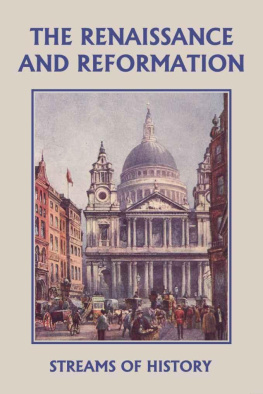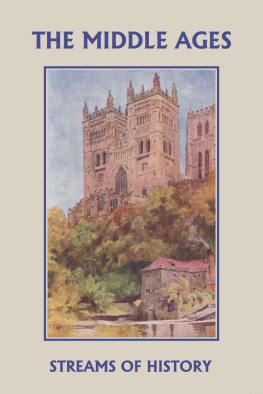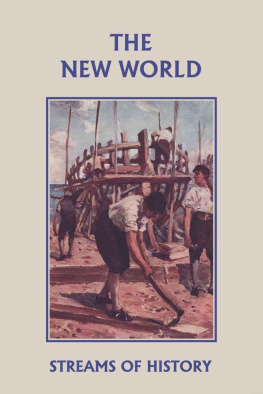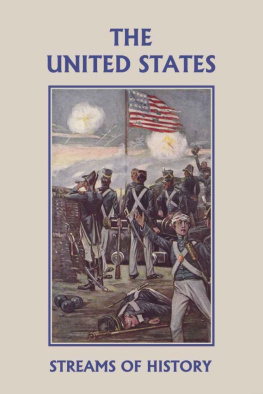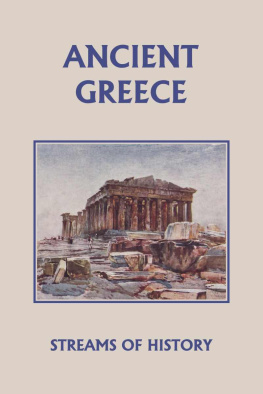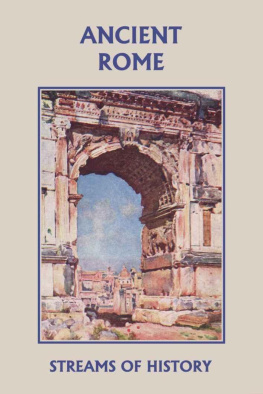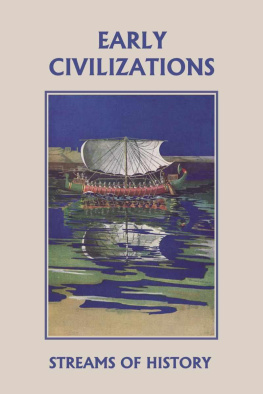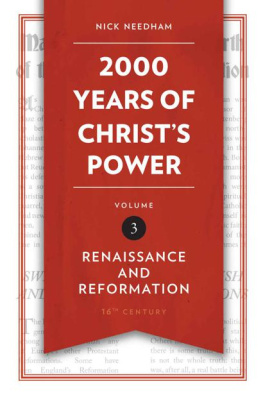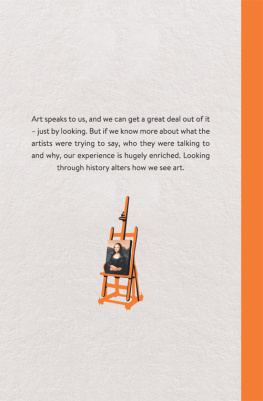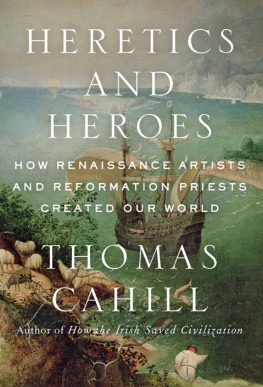Ellwood W. Kemp - Streams of History: The Renaissance and Reformation
Here you can read online Ellwood W. Kemp - Streams of History: The Renaissance and Reformation full text of the book (entire story) in english for free. Download pdf and epub, get meaning, cover and reviews about this ebook. year: 2008, publisher: Yesterdays Classics, genre: History. Description of the work, (preface) as well as reviews are available. Best literature library LitArk.com created for fans of good reading and offers a wide selection of genres:
Romance novel
Science fiction
Adventure
Detective
Science
History
Home and family
Prose
Art
Politics
Computer
Non-fiction
Religion
Business
Children
Humor
Choose a favorite category and find really read worthwhile books. Enjoy immersion in the world of imagination, feel the emotions of the characters or learn something new for yourself, make an fascinating discovery.
- Book:Streams of History: The Renaissance and Reformation
- Author:
- Publisher:Yesterdays Classics
- Genre:
- Year:2008
- Rating:3 / 5
- Favourites:Add to favourites
- Your mark:
- 60
- 1
- 2
- 3
- 4
- 5
Streams of History: The Renaissance and Reformation: summary, description and annotation
We offer to read an annotation, description, summary or preface (depends on what the author of the book "Streams of History: The Renaissance and Reformation" wrote himself). If you haven't found the necessary information about the book — write in the comments, we will try to find it.
Streams of History: The Renaissance and Reformation — read online for free the complete book (whole text) full work
Below is the text of the book, divided by pages. System saving the place of the last page read, allows you to conveniently read the book "Streams of History: The Renaissance and Reformation" online for free, without having to search again every time where you left off. Put a bookmark, and you can go to the page where you finished reading at any time.
Font size:
Interval:
Bookmark:
All rights reserved. No part of this book may be reproduced or retransmitted in any form or by any means without the written permission of the publisher.
This edition, first published in 2010 by Yesterday's Classics, an imprint of Yesterday's Classics, LLC, is an unabridged republication of the work originally published by Ginn and Company in 1902. This title is available in a print edition (ISBN 978-1-59915-258-5).
Yesterday's Classics republishes classic books for children from the golden age of children's literature, the era from 1880 to 1920. Many of our titles are offered in high-quality paperback editions, with text cast in modern easy-to-read type for today's readers. The illustrations from the original volumes are included except in those few cases where the quality of the original images is too low to make their reproduction feasible. Unless specified otherwise, color illustrations in the original volumes are rendered in black and white in our print editions.
T HE stream of history is something like a river. The river rises often as a mere rivulet, but as it flows along, one tributary after another falling into it, first from one side, then from the other, it becomes wider and deeper, its current stronger, and its course continually more difficult to change.
We have now seen something of the early part of the stream and of the great men, cities and nations which grew up along its course. First arose great cities like Memphis and Babylon in the valleys of the Nile and the Tigro-Euphrates. Here man lived very simply. He was just working out an alphabet and the art of writing, and was making his first steps in literature, art, language, religion and government. Then as the stream flowed on westward, circling around the Mediterranean, the Phnicians adopted the alphabet and the other useful things which the Old East had worked out, and through their trade scattered them around the Mediterranean coast as a farmer scatters seed on his fields. These things brought from the early nesting-places of civilization in the Orient furnished a foundation for the civilization of Greece, which thus by catching up the best ideas of the past, and adding to them her great ideas of literature, art and philosophy, made Athens the mistress of the Mediterranean. The stream then flowed on westward to the Italian peninsula. Here Rome, starting like a spider in the center of Italy, industriously spun its web out farther and farther till it caught and drew to its center all of the peoples living in the Mediterranean basin. From these people, and especially from the Greeks, Rome learned the lessons of art and literature and philosophy, but in turn taught them lessons of government, teaching them, however, not so much how to rule themselves, as how to be ruled by Rome. The imperial city became the center of the world, toward which every man, city and province looked as the giver of peace and order, and as the regulator of every detail of life. Thus Rome added to the great stream of human history the idea of a strong central government , giving out rules and laws to a vast empire, having a population, at its greatest, of perhaps one hundred and twenty million people.
But when the rude Teutons came through the passes of the Alps and gradually took possession of Rome, it looked for a time as if the stream of history was to be choked up and to flow no farther. It seemed as if the wealth and learning which had come down from the East, the art of Greece and the law of Rome, were all to be lost by the rude shocks of the uncivilized barbarian who at first seemed to care nothing for any of them. But slowly, and almost so noiselessly as not to be heard (except in time of intense persecution), the Christian missionary was opening up the channels through the Alps, so that the historical stream might flow northward from the Mediterranean into western and northwestern Europe.
Thus gradually through the monastery and the castle, and by the great movement of the Crusades and the Renaissance, were the channels opened so that all the great thoughts and ideas of the past might become the inheritance of the rude, uncultured children now ruling Europe. But these Teutons, who had spread as hunters, herders and fishers through the northern woods and valleys were not merely to have their lives enriched by coming to understand the great ideas of the past; they themselves, notwithstanding they were rude and barbarous at first, had also ideas which were greatly to advance the modern history of man.
The most important of these ideas was their strong love of individual freedom. When we were studying the early Germans in the previous volume of this series, we saw how intense was their love of liberty. Every man liked to rule himself, or at least to have an equal share with everybody else in electing the chief who was to rule him. He insisted on having an equal share in the public land, in the spoils gained in war, and when he built his villages he placed the huts so far apart that every one could have plenty of elbow room.
If the Teuton's love of individual liberty and local government as it was worked out in his "moot-court," could be preserved and added to Rome's great idea of a strong central government, then the modern European nations could build their foundations upon both ideas,that is, they could have in the first place a strong central government to hold the people together and keep them in order, and keep off foreign enemies, and protect their commerce, and coin just one kind of money and the like; and yet, in the second place, they could have an active local government, which would allow the people to have their little meetings and assemblies near home where all could attend and take part in thinking out and making laws regulating their home affairs, such as dividing the land, pasturing the stock, building roads and the like. If both these ideas of government could be wisely united, a stronger and better kind of government than even Rome had developed, could be built up in the modern states.
Now there were many nations which finally sprang up, more or less, out of the Teutonic tribes. Spain, France, Germany, Italy and England were all growing to be strong nations, at the close of the fifteenth century,that is, at the time Columbus discovered America. But among all these, there was but one single nation at this time that had, through many hard struggles and through hundreds of years, held firmly and constantly to the Teutonic idea of individual liberty, and the right of a man to rule himself, either directly or indirectly, by electing those who were to rule him.
This one nation was England. All the other great nations in Europe were slowly crushing the Teutonic spirit from their midst. This came about largely because the southern nations had sprung up on soil where the roots of the old Roman ideas of government were planted very deep and were therefore strong, and because these nations, living not so very far away from Rome, frequently thought of the great empire, and tried to build their governments upon the model worked out by Rome,that is, upon the idea of a strong central government ruled arbitrarily by one man. Spain and France in particular had crushed out all thought of the Teutonic idea of local self-government, and in neither country at the time of the discovery of America were there regular assemblies or a parliament for making laws to which the people could go themselves or send their representatives.
Font size:
Interval:
Bookmark:
Similar books «Streams of History: The Renaissance and Reformation»
Look at similar books to Streams of History: The Renaissance and Reformation. We have selected literature similar in name and meaning in the hope of providing readers with more options to find new, interesting, not yet read works.
Discussion, reviews of the book Streams of History: The Renaissance and Reformation and just readers' own opinions. Leave your comments, write what you think about the work, its meaning or the main characters. Specify what exactly you liked and what you didn't like, and why you think so.

